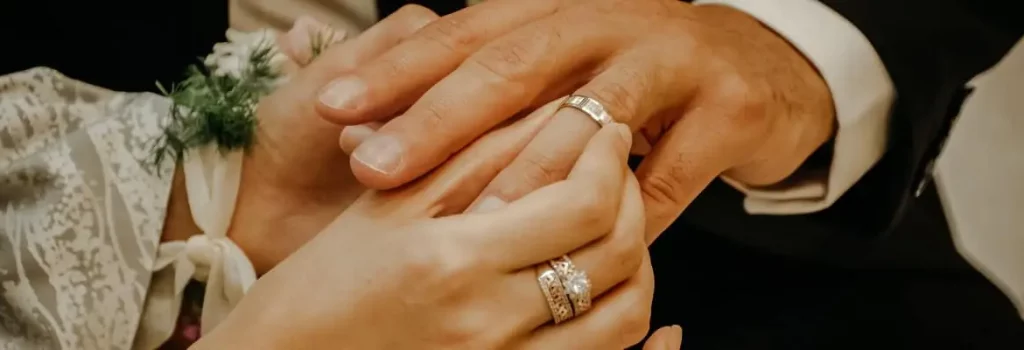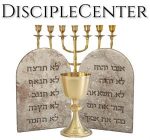
DiscipleCenter Statement on Marriage
By H. Bruce Stokes, Ph.D.
In recent years, the increasing secularism of American culture has had an effect on ideas about gender, sexuality and marriage. The controversy regarding gay marriage (same sex civil unions and gender neutral marriage) continues in several states, the courts and within some Jewish and Christian denominations and congregations. The new law in New York, one of the latest decisions to impact this subject, makes it clear that the issue is still problematic for many people. This statement is intended to clarify the position of the DiscipleCenter congregation regarding our perspective as it relates to Holy Matrimony (religious marriage) and Civil Unions (legal marriage) of any type.
The DiscipleCenter congregation is Judeo-Christian. This means that we acknowledge a faith that is dependent on the sacred scriptures of Judaism and Christianity and is informed by both of these religious traditions. More specifically, we are directly affiliated with the Southern Baptist Convention and the Messianic Jewish movement. This places us within the “Free Church” tradition. This tradition is bound to Scripture by commitment to its authority and generally to the traditions of Orthodox, Conservative and Reform Judaism, as well as Orthodox, Catholic, and Protestant Christianity under the Baptist notion of the “Liberty of Conscience”.
Based on this commitment to Scripture and perspective on tradition, our understanding of marriage is that it is first and foremost a divinely sanctioned institution incumbent upon religious Jews and Christians. This religious institution is independent of and distinct from cultural, ethnic, or legal marriage. This follows our Judeo-Christian understanding of the Genesis account of the creation of man and woman in the image of God, and the command to leave one’s parents and become united in marriage. As such, it is not a legal institution, but a spiritual and communal one binding us to God and to each other by vow and commandment and lived out before our community of faith and all human kind. This Holy Matrimony therefore cannot be established or dissolved by the state. We also believe that no Judeo-Christian representative (clergy or otherwise) may grant this Holy institution to unbelievers (those outside of the religious community).
We do acknowledge that our faith requires that we consider the state to be sanctioned by God for the reward of those who do good and the punishment of those who do evil. We further acknowledge that we are required to live at peace with all persons to the extent that it depends on us and we are to render to civil authority due respect and obedience under God.
American civil law has always granted to religious marriage certain legal privileges and responsibilities by accepting our religious marriages as legally valid with regard to these rights. In addition, we affirm that these rights have been also given to persons from other religious and cultural traditions without conformity to Judeo-Christian requirements. Historically, two exceptions to this should be noted. One is that polygamy has been placed outside of that legal system, and second, same sex unions have also been denied recognition until the present controversy. At present, Holy Matrimony (religious marriage) is fully accepted by the US federal and state governments as a valid marriage without exception.
We further acknowledge that Holy Matrimony has been practiced with varying consistencies by those claiming the Judeo-Christian faith and traditions within Judaism and Christianity. In Judaism and Christianity, religious marriage has included religious divorce based on Torah and Canon law respectively. Among the Free Church tradition, this has been more problematic. Confusion and overlap regarding the nature of Holy Matrimony and Civil Marriage has resulted in many within these churches seeing no difference between legal and religious marriage. This is made more difficult by the fact that Free Church Evangelicals and Non-denominationalists (and to a great extent Baptists) have allowed civil divorce to serve as the dissolution of a religious marriage without providing a real option for a religious divorce system. This may be, in part, because the Baptist and Free traditions have been silent or unclear regarding the place of marriage as a sacrament or ordinance. Orthodoxy in both Judaism and Christianity maintain distinctions between religious and secular marriage (including divorce and annulment) but Free churches and Independents do not always follow this distinction.
This distinction is important. Religious marriage must be under religious authority and civil marriage (unions, contracts, etc) must be under state authority. A free church, free press, free state, and free market system has been a Baptist ideal in America since the beginning of this country. This is consistent with the Jewish Diaspora perspective which has maintained Jewish marriage within many cultures and state systems. It also serves the Eastern Orthodox and Roman Catholic perspective that views Christian marriage as a sacrament. This distinction is protected by the Establishment and Free Exercise clause in the Bill of Rights. And this is the reason converts to Christianity have been required to bring their existing secular marriage under religious authority by solemnization in most traditional religious denominations. This is the practice of the DiscipleCenter as well.
From its founding, the DiscipleCenter congregation has held the historic Judeo-Christian view that marriage is:
1. A religious institution (sacramental ordinance) commanded by God to his people
Israel and extended to Gentile Christians through the Gospel.
2. A uniting of a man and woman in a lifelong commitment.
3. The establishing of a household autonomous from parents.
4. Foundational to the procreation and parenting of children.
5. Validated by religious authority rather than state authority.
6. Expressed by the requirement of a religious ceremony and prescribed marital roles.
7. Not dissolved by a civil divorce.
We have not in our history, nor do we presently recognize any civil marriage to be a religious marriage unless that marriage is solemnized by a religious ceremony indicating a conforming of the civil marriage to meet the criteria stated above. We are not denying the power and authority of the state to establish and regulate legal
marriage for the common good but civil marriages are not religiously accepted merely on the basis of their legal standing with the state. In addition, we do not consider our marriages to be validated by the state. We are satisfied that our marriages are recognized by the state as legal with regard to marital status and family rights under federal and state laws.
When the civil authority (federal or state) changes, amends or alters the legal and civil definition or rights associated with the legal status of marriage, its only effect on religious marriage is whether or not religious marriage continues to be granted full legal status and rights under that authority. Therefore, the emergence or potential for same sex marriage or gender neutral unions as legal options in certain states or the United States as a whole does not change our view or practice. We continue to accept only religious marriage as acceptable to our congregation for membership and participation in religious community.
As individual citizens of this country we enjoy the right and responsibility to speak to the issue of the implications and advisability of changing the historic structure of marriage as a social institution and legal union of a man and woman as well as the culturally traditional understanding of the household and family as based upon this structure. It is understandable that our religious perspective would inform that discussion of the issue in social, cultural, legal, parental, and educational contexts. But our opinions on the matter and our individual votes are part of our civil rights and responsibilities, not enforcement of our religious practice. As a congregation, we take no political position except to assert our perspective on the difference between religious and civil marriage in regard to our faith and practice of religion.
